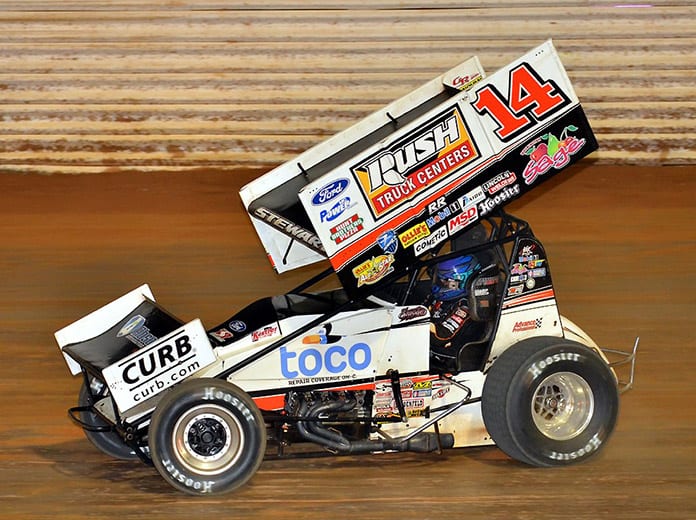DEARBORN, Mich. – The long-awaited Ford 410 sprint car engine is finally a reality.
The FPS 410, short for Ford Performance Stewart 410, is a collaboration between Ford Performance, Tony Stewart/Curb-Agajanian Racing and Durham Racing Engines to equip Stewart’s sprint car operation with Ford power.
The engine debuted on Aug. 16 at I-96 Speedway in Lake Odessa, Mich., and went to victory lane for the first time two weeks later when Stewart won a Bumper to Bumper IRA Outlaw Sprint Series event on Aug. 31 at the Plymouth (Wis.) Dirt Track.
Stewart will wheel his Ford-powered 410 sprint car this weekend, Sept. 27–28, in a pair of IRA events in Wisconsin. The Bumper to Bumper IRA Outlaw Sprint Series will visit the Dodge County Fairgrounds on Friday and the Plymouth Dirt Track at the Sheboygan County Fairgrounds on Saturday night.
“A lot of time and effort has been spent by our team working with the people at Tony Stewart Racing to make sure that when we put this engine in competition, it would be good right out of the box,” said Mark Rushbrook, global director, Ford Performance Motorsports.
“Seeing that come to fruition is a testament to all the hard work by everybody who has been involved in this project, and we look forward to Tony and others winning many more races with it in the years to come.”
“I am so incredibly proud to see the FPS 410 sprint car engine program come to fruition,” said Tony Stewart, three-time NASCAR Cup Series champion and TSR owner/driver. “The hours, innovation and effort that has gone into making this Ford program a reality is immeasurable.

“To not only have a race-ready engine right out of the gate, but to have had the privilege of competing with it on its maiden run is truly a highlight of my racing career. As both an owner and driver, I’m incredibly proud that our organization has had a hand in writing a new chapter in the history of sprint car racing alongside an iconic American brand like Ford.”
Reaching the point of having the engine race-ready was a challenge due to TSR’s intense racing schedule, which can include as many as three multi-state events per week. As a result, engineers decided to use actual races as part of the on-track validation process.
“We thoroughly dyno tested the engine at multiple phases to make sure that both performance and durability were where we wanted them,” said Christian Hertrich, motorsports powertrain supervisor, Ford Performance. “We didn’t have the opportunity to test it in a car until last month, because you need to have that real-world data to understand how it’s functioning. It just so happened that the first on-track test was an actual race.”
Development of the new Ford engine will continue through the rest of this season, with the hope that it may become part of a customer program in the near future.
“The goal of this engine program is to be able to introduce the FPS 410 engine to the sprint car community by this time next year,” Stewart said. “I know we have a powerplant that will immediately challenge for wins across many tracks and series. I really have to thank Mark (Rushbrook) and his engineering team and the resources they have allowed us to lean on. On the same level, Andy (Durham) has spent countless hours with Ricky (Warner), Ron (Shaver), Roush-Yates and many others. Without these folks, we wouldn’t be where we are today.”
Ford’s participation in sprint car racing has been limited, but that could be changing with the completion of this engine and TSR’s continued commitment to the series.
“This is another step in immersing ourselves in this form of racing,” said Rob Johnston, global marketing manager, Ford Performance. “Signing Chase Briscoe as a development driver and Stewart-Haas Racing switching to Ford in 2017 has opened new opportunities in sprint car racing from a marketing perspective.”
